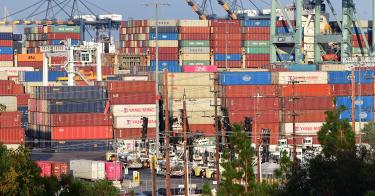The Biden administration announced last Wednesday that the Port of Los Angeles will now operate 24 hours a day. That’s belated good news, but how operations have been going at the neighboring Port of Long Beach, which is also operating around the clock, suggest that this might not be enough to solve California’s supply chain collapse.
At Long Beach, trucking and warehouse operations have not adapted to the new hours, with many truckers complaining of burdensome regulations regarding making appointments to pick-up and drop-off containers during the added shifts.
The supply chain problems are more deep-seated than they look, and the critical factor at play is how quickly the new 24/7 measures may improve a complex supply chain network that has been strained to a snapping point.
As a recent Financial Times article underscores, “The US is facing a shortage of warehouse space and truck drivers, and shifting to 24/7 operation will require enormous co-ordination between the publicly operated ports and private sector groups, including large retailers and freight companies.”
The Port of Los Angeles has been operating on a reduced schedule for months, even as record imports have piled up there. That has led to a bottleneck of 73 or more ships waiting off the coast of Los Angeles, compared to usually no more than one ship waiting for a berth in more normal times.
Indeed, most people don’t think much about worldwide supply chains until they go wrong. But when the music stops, and supply-chain bottlenecks occur, that is when the importance of unimpeded supply chains becomes very apparent.
We are seeing the breakdown that can occur when even a single link in a supply chain experiences a problem.
In Los Angeles, there is a lack of workers available to unload and load container ships, and a lack of truck drivers to transport the cargo from the ports to inland destinations. To make matters worse, most of the warehouse space near the ports is packed, leaving nowhere to put new imports when they arrive.
How did this happen?
California had some of the most stringent COVID-19 limitations of any state in 2020 when the horrendous backlog began. There was a need for more workers as demand for imported goods was skyrocketing, but California had far fewer available due to drastic government restrictions.
In addition, overly generous government unemployment payouts reduced the need or incentive for people to work, reducing the available supply of willing truckers or longshoremen.
When the supply chain is pinched like this, inflation rears its ugly head.
Federal Reserve Chairman Jerome Powell has blamed recent inflation on supply chain bottlenecks. When these bottlenecks occur, consumers and businesses soon experience shortages of basic commodities and goods like new and used cars, washing machines, or medical supplies. Inflation soon follows.
Unfortunately, many bottlenecks in supply chains occur because of government meddling.
Politicians’ recent alarm over the Port of Los Angeles should be focused on how government officials forced docks and logistics companies, and everyone else, to follow everchanging, arbitrary COVID-19 restrictions, which worsened repeated green and labor mandates that have gummed up supply chains for years.
More likely, officials will respond with even more shortsighted and politically driven mandates, such as “Buy American” restrictions, or with expensive subsidies to create alternative supply chains to those they are mostly responsible for breaking in the first place. The American people will pick up the tab on these costly measures.
In the end, every development that adds a government-imposed obstacle somewhere in the supply chain and economic activity makes the U.S. economy less dynamic and undermines America’s economic freedom, rendering Americans’ lives harder and less prosperous.
This piece originally appeared in The Daily Signal



